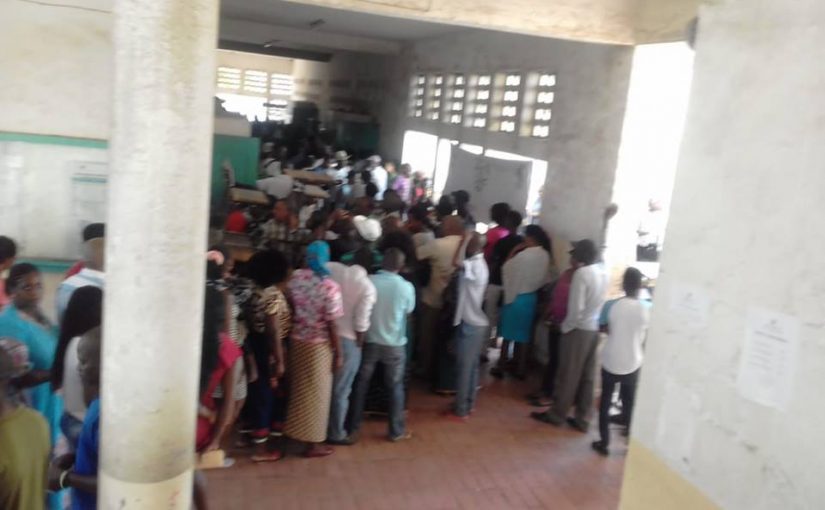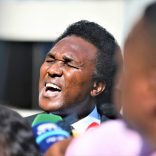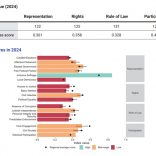Mozambique: Frelimo Youth League launches 48th anniversary celebrations
Constitutional court rejects MDM Matola appeal

People voting in Matola on October 10. Photo: Jornal Visao
The Constitutional Council, Mozambique’s highest body in matters of constitutional and electoral law, has rejected the appeal by the opposition Mozambique Democratic Movement (MDM) against a court decision denying its attempt to overturn the municipal election results in the southern city of Matola.
The MDM was not claiming victory in Matola, but alleged that 4,000 votes had been fraudulently switched from the MDM to the ruling Frelimo Party.
If this allegation were true, it would have two effects. The extra 4,000 votes would have been enough to push Frelimo into the lead, ensuring that it would defeat the main opposition party, the former rebel movement Renamo. Secondly, an additional 4,000 votes would have given the MDM at least one extra seat on the Matola Municipal Assembly.
But the Matola court did not consider the MDM’s substantive arguments because the MDM appeal was delivered late, and the Constitutional Council found the court acted correctly.
The deadline for appeals fixed in the electoral law is 48 hours after the results have been publicly announced.
The Matola City Elections Commission says it posted the results on its premises for anyone to see on Friday, 12 October. The Constitutional Council, however, took as the real publication date Saturday 13 October, at 09.15, which was when the Elections Commission announced the results at a public ceremony in the Matola Municipal Auditorium.
The MDM thus had until 09.15 on Monday 15 October to deliver its appeal to the Court. But the appeal was only delivered to the court on the following day, 16 October.
The MDM mayoral candidate, Silverio Ronguane, argued that the 48 hours referred to in the Electoral Law means two working days, and does not include Saturdays and Sunday, when courts are generally closed.
But Ronguane is demonstrably wrong. General Mozambican legislation (the Civil Procedural Code) does not exclude Saturdays and Sundays from the concept of “days”, although it does state that when a deadline ends on a Sunday, it can be extended to the following Monday.
“Deadlines fixed in hours, as in the Electoral Law, are substantive”, said the Council, “and they are counted continuously, because the urgency that elections impose on the public administration, on the courts and on the Constitutional Council is not compatible with delays of any kind”.
Furthermore, the MDM had not protested against the alleged fraud to the Matola Elections Commission itself. The Council pointed out that a basic principle in Mozambican electoral law is that irregularities can only be appealed against if a protest is first made at wherever the irregularity was committed – in the case, the City Elections Commission.
The Council noted that there was no sign that the MDM had made any protest at the time of the “intermediate count” announced by the Elections Commission. The MDM’s failure to observe the principle of “prior objection” meant that the Matola Court could not consider its claims.
The Council made no mention of the MDM’s claim that its agent had not even been informed of the intermediate count and the public announcement of the results on 13 October.
One of the most serious MDM claims was that three different final results sheets from Matola were produced, all of them apparently bearing the signature of the chairperson of the City Elections Commission, Carlos Come. Two of these sheets must be fake.
The first results sheet claimed that Renamo defeated Frelimo Party by a narrow margin (less than one per cent). The second results sheet reversed the result, giving victory by Frelimo (thanks to the 4,000 votes switched from the MDM to Frelimo).
But the official intermediate count is contained in the third results sheet, read out by Come, at the 13 October ceremony. It shows almost 23,000 fewer votes cast, and gives Frelimo a narrow victory (again, less than one per cent). Here are the main figures from the three sheets:
Results sheet 1
Votes cast: 320,871
Renamo: 146,341 (47.46 per cent)
Frelimo: 144,744 (46.95 per cent)
MDM: 16,759 (5.42 per cent)
Results sheet 2
Votes cast: 320,871
Frelimo: 148,744 (48.15 per cent)
Renamo: 146,631 (47.46 per cent)
MDM: 12,759 (4.13 per cent)
Results sheet 3
Votes cast: 297,809
Frelimo: 137,875 (48.05 per cent)
Renamo: 135,678 (47.28 per cent)
MDM: 11,799 (4.11 per cent)
The second deputy chairperson of the Matola election commission (CEC), Torina Miquitai, cited by the independent television station STV, insisted that only the first results sheet is genuine. It is the only one recognised by the CEC members appointed by Renamo and the MDM.
Romao Rego, a CEC member appointed by the MDM, said that none of the Renamo and MDM members signed the later two results sheets.
The only alteration in the first two sheets is the 4,000 vote difference between Frelimo and the MDM. But which came first? Were the 4,000 votes taken from Frelimo and given to the MDM to produce the appearance of a Renamo victory? Or were the votes taken from the MDM and given to Frelimo, as the MDM alleges?
Neither, answers the CEC – for the third results sheet is completely different. 23,000 votes have disappeared, increasing the abstention rate from 36.3 to 40.8 per cent. Votes have vanished from all three of the major parties, and also from the five minor parties contesting the election (although their total vote was negligible, amounting to less than half a per cent in all three sheets).
This third sheet is signed, the opposition parties say, only by the Frelimo appointees on the CEC. The MDM and Renamo appointees say they do not know where and how the third result sheet was produced.
The Constitutional Council took no position on this – but since the CEC regards the first two sheets as forgeries, and since forging election documents is a crime, it is handing the matter over to the Public Prosecutor’s Office.
The obvious way to determine the truth would be for the three parties and the CEC top publish on a website the results from all 706 Matola polling stations. The copies of the polling station results sheets that each of the parties and the Commission have should be identical.












Leave a Reply
Be the First to Comment!
You must be logged in to post a comment.
You must be logged in to post a comment.